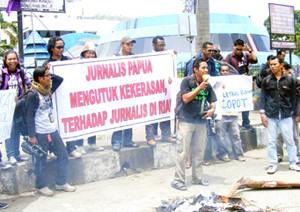
JAYAPURA (Pacific Media Watch / Alliance of Independent Journalists in West Papua): The Alliance of Independent Journalists in West Papua has condemned a draft new autonomy law for Papua that seeks to impose Islamic values on the mainly Christian Melanesian population of the region.
According to the alliance in a statement, the draft law is a copy from a similar law in Aceh.
It has called for a "bottom-up" and transparent development and consultation process.
The alliance cites these provisions in the draft law:
"(1) The Government of Papua has the authority to set the conditions in the field of Press and Broadcasting Based on Islamic values. "; (2) In order to implement the provisions referred to paragraph (1), the Government of Papua in coordination with Papua Broadcasting Commission to set ethical guidelines and standard of broadcasting programmes, (3) Further conditions about the conditions that referred to paragraph (1) should be set into special local regulation (Perdasus) of Papua; (4) More authority in the field of press and broadcasting for the government of Papua, except as set in paragraph (1) and paragraph (2) is performed by referring to the national regulations ..."
The draft Act of Papua Government (RUUPP) is proposed by the Papua regional government to revise Law No 21 on Special Autonomy for Papua.
Scrutinising the media provisions in this draft law, the Alliance of Independent Journalists (AJI) City Jayapura found that these provisions had been "plagiarised" from the Law of Aceh Goverment.
This article was against the local realities of the majority of the Papuan population who were Christian, said the alliance.
Also, it was clearly an attempt to control the freedom/independence of the press in Papua.
The draft RUUPP law should have taken into account that the press was an independent entity that served to control the climate of a country's democracy. In this case, the press was often mentioned as the fourth pillar of democracy besides the legislative, executive and judiciary, the alliance said.
Indonesia, as a democratic country, has a regulation to manage the roles and functions of the press and other matters relating to the press through the Principal Act No. 40/1999.
This Act recognises the national press as a vehicle of mass communication, dissemination of information, and opinion builders must be able to implement the principles, functions, rights, obligations, and role as well as possible based on the professional freedom of the press.
"So the media should have legal protection ensured, as well as freedom from interference and coercion from anywhere," the alliance said.
Act No 40/1999 also had memastikanpembentukan (Pess Council) as an effort to develop an independent press freedom and improve the lives of the national press, the alliance said.
Against the background outlined above, the Alliance of Independent Journalists of West Papua:
1. Rejects all forms of intervention that aim to curb freedom of the press in any form, including the intervention of the government (central and local). Roles, functions and everything related to the press have been mandated by Act No. 40/1999.
2. Rejects the use of religion as a justification for the government to set the conditions on press and broadcasting activities, and
3. Calls for development processes, as well as legal drafting processes, that regulates basic needs of the people being done in a bottom-up process, participatory and transparent.
This work is licensed under a Creative Commons Attribution-NonCommercial 3.0 New Zealand Licence.




